RV Electricity Dos and Don’ts
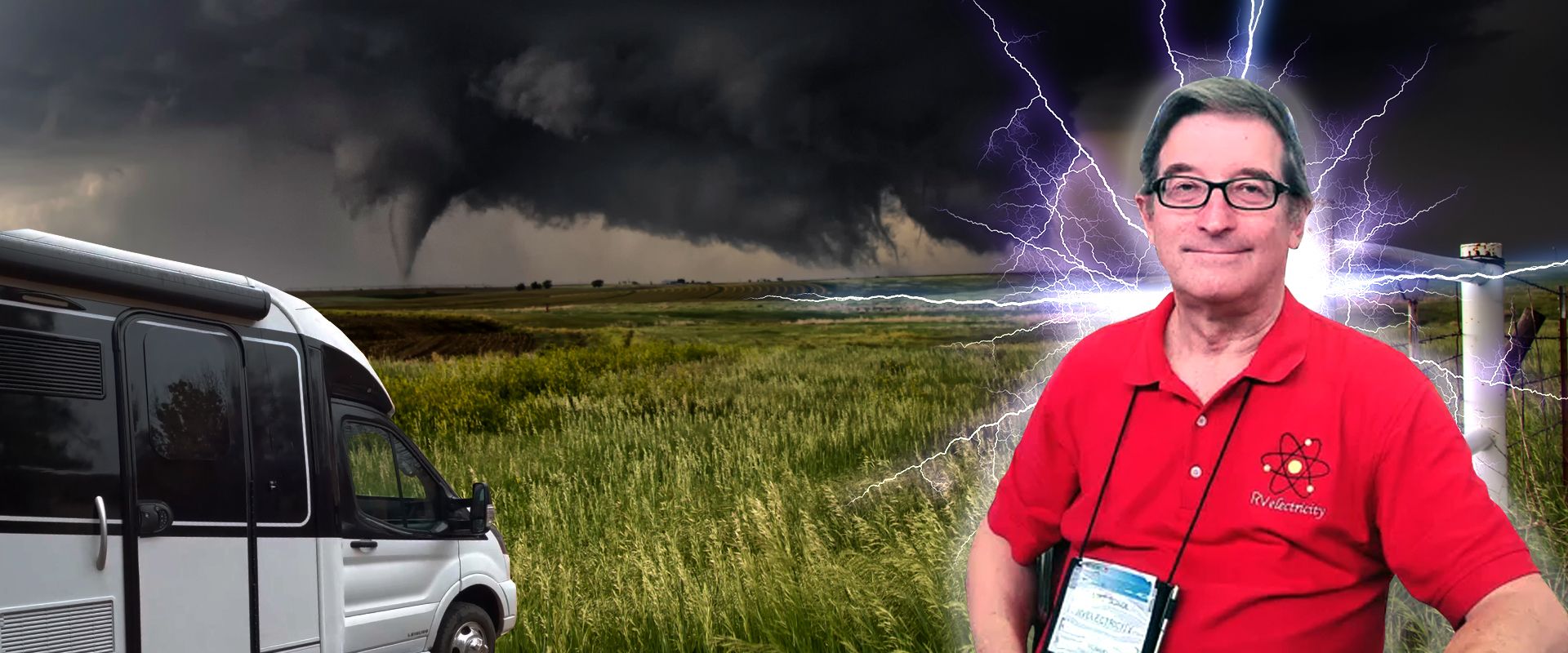
Whenever you take your RV out of storage, there are some RV Electricity Dos and Don'ts you need to know. A top expert gives advice…
This article is based on a podcast interview with Mike Sokol, which you can listen to or watch by scrolling to the end. We have organized his advice into this article.
Mike Sokol has over 50 years in the industry and is an expert on all things electric in an RV. He talked with us about waking up your RV's electric system after it's been sitting for a substantial amount of time.
Here's how to prepare your RV’s electric system for the camping season, covering batteries, putting water in the water heater before turning that on, and much more.
RV Electricity Dos and Don'ts – Expert Advice

Let's start with the Dos- what you should do to prepare and ‘awaken' your RV electrical system. This includes some things that you should have done before storing your RV, but at least you'll know for next season!
Then we'll move on to the Don'ts. We'll cover the things you need to avoid doing to save yourself money and headaches.
As a true pro, Sokol provided helpful slides of the key points, which we share in each section.
1. Fill Your Water Heater Before Turning On Power
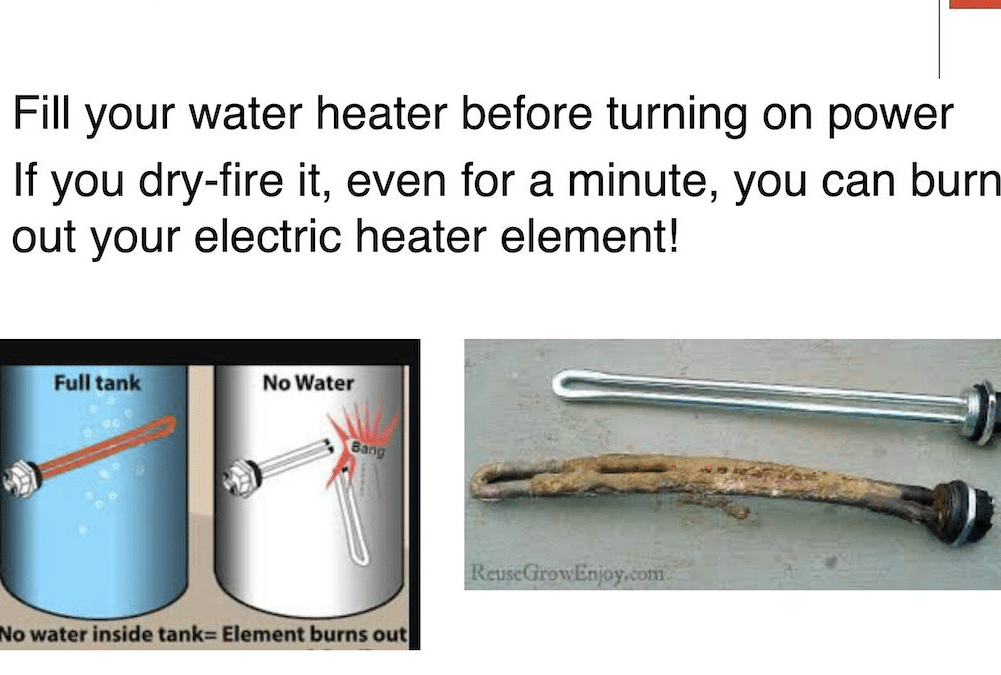
If you have a tank water heater, make sure you fill it with water before turning the power on. If you dry-fire it, even for a minute, you can fry your electric heater element.
If you make this mistake and burn out your heater element, you can replace the heating element. However, it's a pain and you often need a special tool to remove and replace it.
Small water tanks can have the same issue since most have some sort of electric aluminum element in them. So, DO fill up your water heater tanks before turning the power on.
2. Check Your Water Levels on Your FLA Batteries

Ideally, you should have connected your batteries, especially FLA batteries, to a battery tender or smart battery charger to keep the charge up. But, if you didn't and your batteries need charging, you need to check their water levels first.
Use distilled water to fill it up to the proper level. Be sure to wear safety glasses! Your eyes can be severely damaged if water splashes out of the battery into your eyes.
3. Disconnect 6 Volt Batteries & Charge Separately
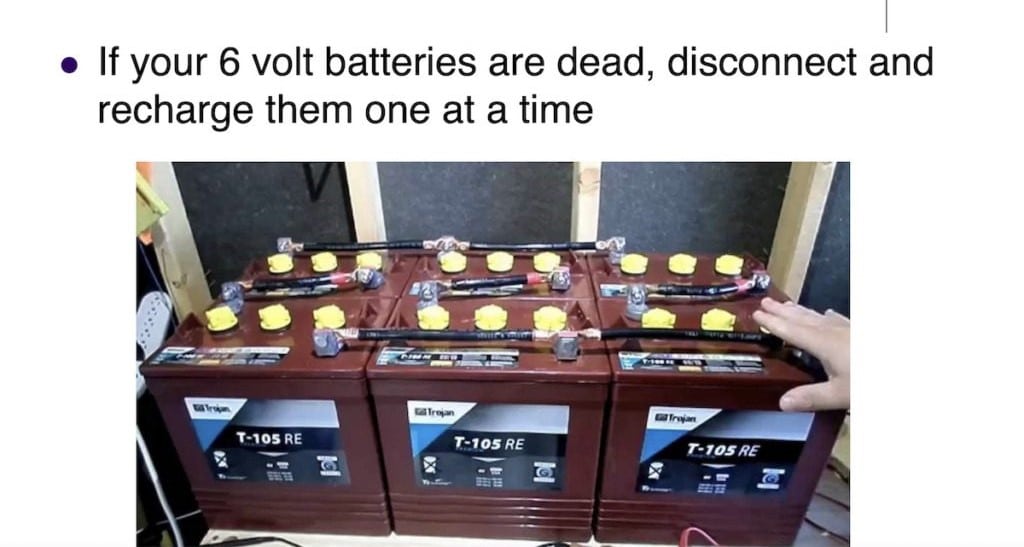
If your RV has dead 6 volt batteries, the safest thing to do is disconnect one of the leads from each one and charge them separately. Sokol found that if they didn't discharge evenly, they wouldn't all come back up to full charge at the same time.
Normally, it's okay to charge them all with a single 12 volt charger. But, if they're dead, they're going to be unequally dead. Therefore, it's best to charge one at a time to get them all up to full charge.
3A. Take a Picture Before Disconnecting
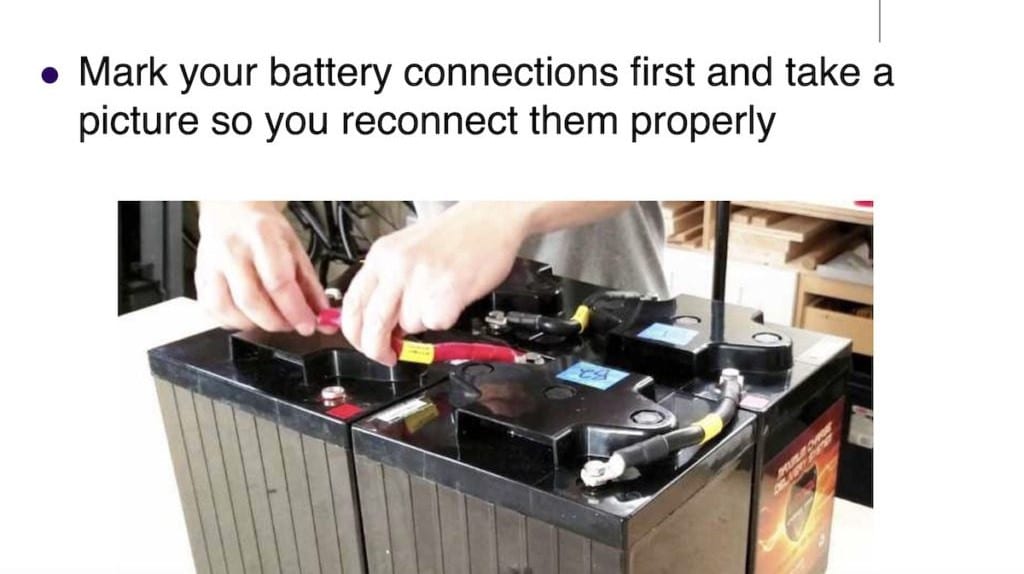
MThe connections can get a little confusing, so Sokol highly recommends taking a picture before you disconnect anything. He also says to mark each cable by wrapping them with tape and rotating where they belong.
This makes it easy to hook everything back up exactly the same way. Because if you get something backwards, even for a fraction of a second, you can fry your converter, inverter, appliances, etc.
3B. Know Which Cables to Take Off & Put On First
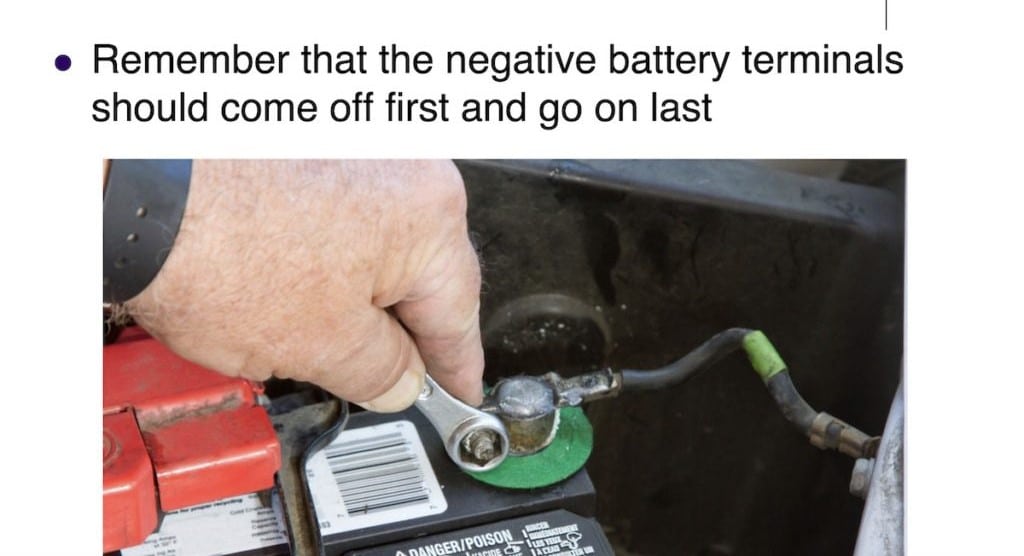
Remember this: Negative battery terminals come off first and go on last! But, keep reading for more important information…
When you disconnect your batteries, disconnect the black negative cable closest to the negative terminal hooked into the chassis FIRST. Disconnecting this negative terminal first is the safest because it's at the same voltage.
If you try to take the red cable off first and accidentally touch your wrench or wedding ring to the chassis, bad things will happen. Your wrench or wedding ring will essentially weld to whatever it's touching (including you) and can even lead to the battery exploding.
The same is true in reverse. So, remember, negative battery terminals come off first and go on last! And remove the negative terminal closest to the chassis first.
4. Clean Your Battery Terminals & Hands
If you see corrosion on your battery terminals, which often looks like a white buildup, you want to clean it off. Mike Sokol recommends using baking powder and a wire brush.
Sokol also recommends wearing old clothes whenever you work with batteries and to always wash your hands after. Touching the battery and then touching your clothes (or other things) can cause damage.
5. Replace the Fuel and Oil in Your Generator
Ideally, you should have drained the gasoline out of your generator before putting your RV in storage. And, ideally, you should have also replaced the oil in your generator before storing your RV.
At the very least, you should have added fuel stabilizer treatment before storing and ran the generator once a month or two while in storage.
If you didn't do any of the above and your generator sat for several months with old oil and old gas, Sokol recommends replacing the oil. And, he recommends either replacing the gas or adding an extra dose of fuel treatment.
6. Put New Batteries in Multimeter
Don't leave batteries in your multimeter while it sits in storage! A multimeter is a must-have tool for RVers. You always want to keep a multimeter tool in your RV. But multimeters use batteries, and those batteries can corrode.
So, Sokol recommends removing the batteries from your multimeter before you put your RV in storage. Then, of course, replace the batteries when you take it out of storage and before you head out on your first camping trip of the season.
7. Tighten Screws on Your Power Distribution Panel
Another thing Sokol learned from experience is that screws on terminating wires often come loose as you travel. This isn't something the manufacturer did wrong. Rather, it occurs because of consistent vibration from driving down the road.
So, Sokol recommends checking the screws in your electrical panel and tightening any that have loosened over time. He also recommends checking your automatic transfer switch, generator transfer switch, and basically any screws on electrical panels and connections.
Listen To or Watch Mike Sokol's Interview
Here is the interview with Mike Sokol, Episode 441 of the RV Podcast on how to safely wake up your RV's electrical system.
To see a video version of the podcast, click the player below.
For an audio-only version, download the podcast on your favorite podcast app or click the player below.
Podcast: Play in new window | Download (Duration: 52:44 — 30.8MB) | Embed
Subscribe: Spotify | TuneIn | RSS
RV Tip from Queen Bee – An RV Safety Checklist

During this same podcast, certified RV Inspector Brenda of Queen Bee RV shared some helpful safety tips.
Brenda’s focus is on educating RVers on how to care for their RVs – especially women RVers. Watch her tips here or read what she had to say…
RV safety plan for peace of mind
As a female RVer, I get the question frequently, “Aren't you scared?” I can honestly say that I mostly experience great comfort when I am camping, and for several reasons.
One of the RVing choices I make that gives me confidence is the fact that I typically camp in some sort of State or National Park, Corp of Engineers, or privately owned campground with loads of other RVers.
The campgrounds tend to be gated, have park rangers on patrol, a camp host on-site, and are somewhat well-lit. I personally love when other RVers have dogs, because they serve as awesome little alarm systems. I also think that people are genuinely looking out for each other in these places.
I have had two experiences that scared me, and I quickly learned something from each of them. One was when my husband and I were camping midweek and ended up being the only campers in our section with no camp host on-site.
A “local” sniffed us out within an hour of setting up camp with the ole “Have you seen my lost dog” line, trying to size us up. I could not sleep a wink that night. Solution? Know where the camp host is, inquire if rangers patrol the area, is it gated, and is there a curfew, etc.
And the other was a tornado weather situation. Solution? Carry a weather radio in case cell and wifi reception are not available.
Here is my short list of things I do or have on hand to help me with peace of mind when I am on the road:
- Rechargeable police flashlight – I love this thing. Lights up a city block with ease. They come in a variety of price ranges.
- First aid kit – bandages, first aid ointment, aspirin, ice pack, etc.
- Weather radio and know where to shelter at the campsite, if needed.
- Cell phone with backup battery charger – my weather radio can charge it, too.
- Tool kit with items like duct tape, bungees, a tarp, and a tire gauge.
- I double-check all of my detector batteries for carbon monoxide, LP, and smoke.
- I practice opening my emergency exit windows.
- I typed up an emergency plan in case of weather, fire, intruder, or medical.
You will be amazed how just a few items can help put your heart and head at ease. And as time goes on, you will gain experience and hear more ideas that will fortify your plan.
Hope these tips were helpful. I will see you next time on another episode.
RV App of the Week

Time now for the RV App of the Week segment, taken from the pages of NewTravelTech.com – our sister blog that celebrates the many ways technology enhances the travel experience.
The app we’re featuring this week came from an article on GPS apps for travelers. It's called Gaia GPS.
If you are a hiker or backcountry explorer or off road enthusiast, you need access to maps. And while there are lots of GPS apps out there, Gaia GPS, is a go-to because no cell service is needed to navigate trails and backcountry adventures.
You can plan offroad travel, find campsites, and use GPS coordinates to mark your base camp and points of interest.
There is a free version that works great if you have cell service. But you need the premium for the offline features. It costs $39 a year but if you are serious boondockers in wilderness areas, it’s a very reasonable investment.
RV Questions of the Week
This question was first posed Sunday night on our “Ask Us Anything” livestream from Deborah Ann and it has promoted lots of discussion and soul searching by those who travel with dogs. She asked:
QUESTION: I was just at a Harvest Host in FL and there was a tornado watch.The host said I can come in her house but not my dogs. I was not leaving my dogs. What would you do? – Deborah Ann
ANSWER: Like Deborah Ann, we wouldn't leave our dog, either. We would have left the location and driven to the nearest shelter in the area… with Bo. Later, Deborah Ann added that she was not criticizing the host. Apparently, the host had her own dogs, and there just wasn't room for more.
But this question gives us all something to think about and include in our planning whenever we camp. We need to be aware of weather conditions and forecasts – always… and we also need to know where is a safe place we can shelter. The terrible storms we’ve had over the past month or so should make all of us realize that an RV is never a good place to shelter in severe weather.
QUESTION: I purchased a copy of your Natchez Trace guide book and am planning to do the trip north to south this August. I know, not great timing. I'll be towing a 28’ travel trailer. I know of others that have made the trip with larger units, so I don't think that's a restricted size. Please let me know if it is.
My question is are there turnouts at all the milepost stops you suggest that I could get in to while hitched up to my trailer? – Randy
ANSWER: Yes, you can easily bring your 28-foot travel trailer on the Natchez Trace. There are a few turnouts where big RVs are prohibited but they are clearly marked on signs to keep you from turning in.
Be sure and consult the map in our Natchez Trace guidebook and stop at a ranger station or check the Natchez Trace website before you take off for any construction detours or road problems but we saw plenty of RVers towing trailers your size or bigger with no issues. Enjoy!

Get the Home Study Course today and worry about the road, not the repairs!
Every time you move your RV it's like driving through a hurricane during an earthquake. Parts break and many items need to be maintained, this program will show you how you can save time and money by gaining the confidence to take on the majority of the issues you’ll come across. Don’t get caught with your RV in the shop! Learn how you can maintain and repair your RV at your own pace and at the most convenient time for you! This course is produced by the National RV Training Academy.
We recommend Hollywood Racks for your RV Lifestyle…
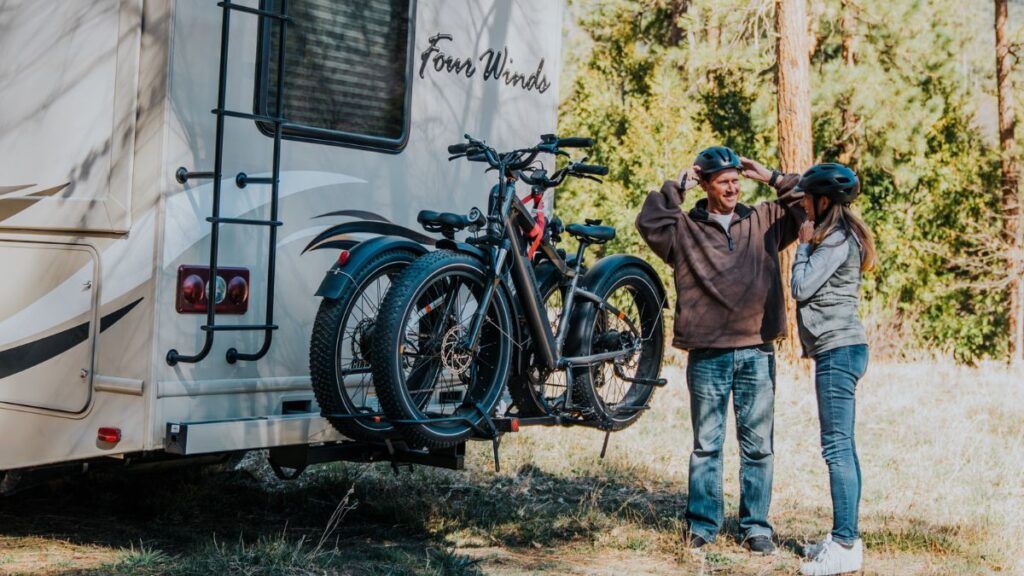
The RV Rider bike rack for RV's, motorhomes, and fifth wheels carries 2 E-Bikes (up to 80 lbs. each) on the back of an RV Motorhome, a 5th wheel, or a flat towed vehicle. A 2″ hitch is required for this rack. Special features include universal heavy-duty wheel holders for heavy load carrying capacity. These wheel holders can fit any tire up to 5″ wide and include a ratchet wheel strap. Locking frame grabbers secure the bikes in place. This bike rack is not compatible with bumper pull, travel trailers or bumper mounted hitch receivers. Enter the promo code RVLIFESTYLE to save 10%
If you want to look at everything they offer, not just the RV Rider rack — go here and explore all the options!

Thanks for another great podcast! I appreciate the reminders about monitoring the weather and knowing where the storm shelters are located. Since we don’t have tornadoes often on the west coast, that reminder for checking with the campground or local law enforcement is welcome.
Thanks for the kind words, Amy! It encouragement is appreciated! Team RV Lifestyle